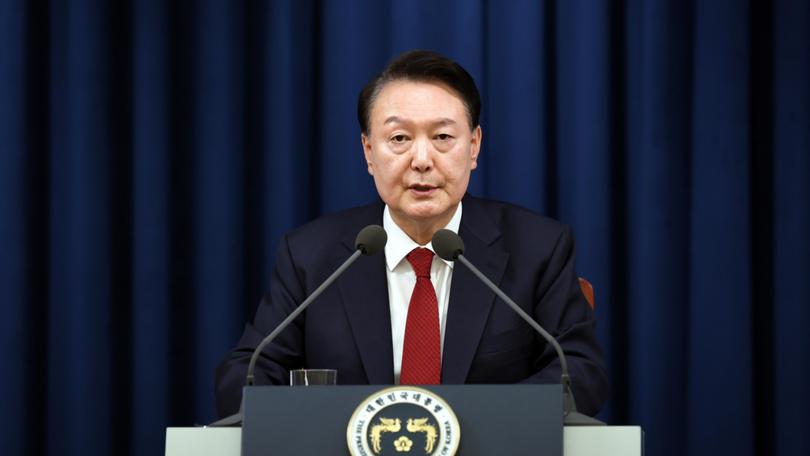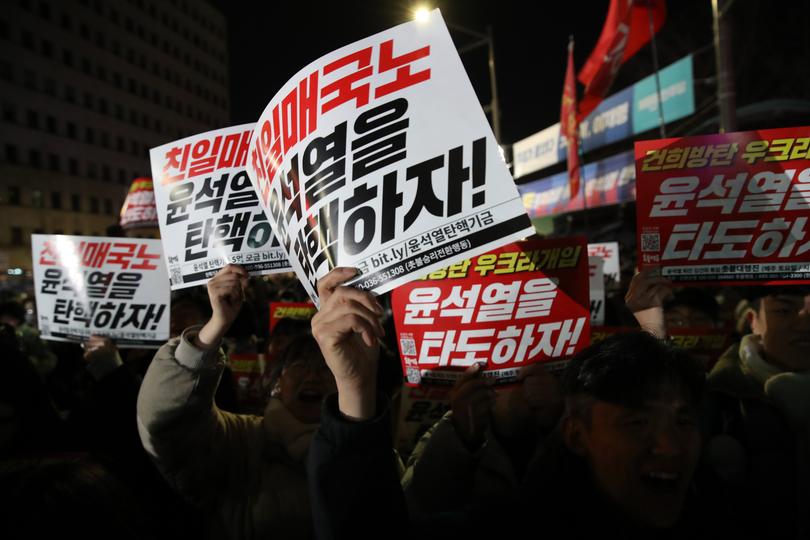South Korea’s President Yoon Suk Yeol spurs his political demise, undermines global reputation
President Yoon Suk Yeol conceded defeat before sunrise, but his drastic actions may have already sealed his own political downfall.

South Korea’s confrontational politics is brutal on a normal day, but President Yoon Suk Yeol’s shock declaration of martial law on Tuesday night triggered the largest political firestorm in generations.
It was a huge miscalculation that spurred immediate calls for his impeachment and risks undermining the Asian tech giant’s rising global reputation as a trusted trade and security partner.
President Yoon threw the world’s 12th largest economy into turmoil by suddenly suspending parliament and introducing military rule to eradicate “shameless pro-North Korean anti-state forces” who, he said, were paralysing the government.
Sign up to The Nightly's newsletters.
Get the first look at the digital newspaper, curated daily stories and breaking headlines delivered to your inbox.
By continuing you agree to our Terms and Privacy Policy.There is no evidence to support the claim of a heightened North Korean security threat. The president’s actions appear, rather, to be grounded in the political stasis caused by his own plummeting popularity and ineffectual rule tainted by allegations of scandals.
The former public prosecutor was elected in 2022 on a tiny 0.7 per cent margin and his approval ratings have dived steadily since.
The opposition parties won an overwhelming victory at April’s elections, and they’ve used their majority in the National Assembly to stifle his agenda and effectively sideline him as a lame-duck leader with a stymied agenda.
The beleaguered president has also been bogged down by an influence-peddling controversy involving his wife – a charge they have both denied – and a crippling months-long doctors strike.
If the sudden declaration of martial law – the first order of its kind since the 1980s – was intended to restore his grip on power then it was a stunning error in political judgement.
The fact that it was blocked within hours is a testament to the robustness of South Korea’s young democracy.
As the military took to the streets, ordinary Koreans and politicians rushed to the gates of the National Assembly and demanded the doors be opened. Images of opposition leader Lee Jae-myung scaling the parliament walls with a GoPro went viral on social media.
Bewildered soldiers following the president’s orders made calm but half-hearted efforts to manage the infuriated crowd, and at least 190 politicians, including 18 from Mr Yoon’s own People Power Party, managed to breach the National Assembly to overturn the decree.
Hong Keewon, a member of the main opposition Democratic Party, was among them, telling the BBC how protesters had given him a leg up over the wall to make it to the vote. “Democracy is strong here,” he insisted.
President Yoon conceded defeat before sunrise, but his drastic actions may have already sealed his own political downfall.
As the dust settled, the liberal Democratic Party, which holds a majority in the 300-seat parliament, immediately called for Mr Yoon’s impeachment and said it will file insurrection charges against him and other top security officials.
Support for his removal, if not impeachment, may also come from appalled members of his ruling party.
“A fierce political storm looms for Yoon whose fate is not in his favour. Both his own ruling party and opposition party want to hold him accountable,” Dr Duyeon Kim, adjunct senior fellow at the Centre for a New American Security told the Nightly.
“For the first time, in a highly polarised country, both sides of the aisle agree that Yoon’s choice in declaring martial law was the wrong move,” she said, adding that “his choice of method in the 21st century” was being viewed as a “miscalculation, and even political suicide.”
The president’s bid to impose military rule for the first time in South Korea’s modern democratic history also caught the country’s close diplomatic allies off guard.

The United States, which stations nearly 30,000 troops near Seoul as a deterrence against the nuclear-armed North, welcomed the rescinding of the order but urged political disagreements to be “resolved peacefully and in accordance with the rule of law.”
Australia joined the US and UK in warning its citizens to be aware of the fluid situation and avoid public protests.
The president’s drastic course of action risked damaging South Korea’s standing as a trusted economic and security ally – a reputation Mr Yoon had, until now, been successfully building through strengthening ties with the US, Japan and regional like-minded democracies including Australia.
The president had been on the forefront of repairing historical grievances with Japan – a bold move that was criticised domestically but lauded in Washington for bolstering a new trilateral alliance to help counter China’s military and territorial ambitions in the Indo-Pacific.
He had also drawn the East Asian democracy closer to NATO and pushed for tighter defence relations with Canberra.
Like-minded democratic allies have now been left questioning South Korea’s short-term stability and any weakening of strategic security ties could have far-reaching implications.
“Yoon’s international reputation as the beacon and symbol of democracy is now shot,” said Ms Kim. “The fate of Yoon’s foreign policies remains uncertain.”
South Korea’s central bank on Wednesday it would “keep all options open” to support its financial markets after the country was rocked by the news.
The economic shockwaves of Korea’s political chaos may also reach the shores of Australia.
The East Asian powerhouse is Canberra’s fourth-largest trading partner, and third-largest export market, and a favoured partner for several major Australian space and defence contracts.
Leif-Eric Easley, professor of international studies at Ewha Womans University in Seoul, said a prolonged standoff between the country’s executive and legislature would continue to produce political instability, and urged the US to ”remain a steadfast ally.”
But Daniel Pinkston, an expert advisor at the Korea Council for Peace and Cooperation, said that while the president’s decision undermined faith in his ability to make the right calls internationally that the country’s rapid reaction would conversely restore global trust in its “strong rule of law.”
“It shows that one man can’t pull off such an extraordinary act … that the people and the institutions don’t tolerate this,” he said.
Since the Korean Peninsula was ripped apart by the 1950s Korean War, which initially left both sides in dire poverty, the South has proven its resilience by emerging as an economic miracle.
But the now bustling modern society was ruled by brutal military dictatorship until 1988 – a living memory that makes much of its 51 million population fiercely protective of its hard-won democracy.
South Korean society is strong enough to withstand the latest crisis, but it now faces an uncertain few months ahead.

